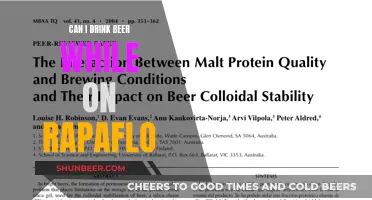
Drinking alcohol before surgery is not recommended and can cause severe complications during the procedure and recovery. Even a single drink the night before surgery can be dangerous and cause problems with anaesthesia, increased bleeding, delayed recovery, and interference with medication. Alcohol can thin the blood, affecting the body's ability to clot and control blood loss, and can also impact the liver's ability to metabolise multiple substances. It is generally recommended to avoid drinking alcohol for at least 48 hours before surgery, and in some cases, abstinence for several weeks beforehand may be advised.
| Characteristics | Values |
|---|---|
| How long before surgery should you stop drinking alcohol? | It is recommended to stop drinking alcohol at least 48 hours before surgery. However, if you drink more than 2-3 drinks daily, you should abstain for at least 2 weeks before surgery. |
| Why you shouldn't drink alcohol before surgery | Alcohol thins the blood, making it harder to control bleeding during surgery. It can also interfere with anesthesia and delay recovery. |
| How soon after surgery is it safe to drink alcohol? | It is generally recommended to wait for at least 2 weeks after surgery before consuming alcohol. This may vary depending on the procedure, medical history, and surgeon's preference. |
| Effects of drinking alcohol after surgery | Drinking alcohol after surgery can cause delayed healing, increased risk of swelling, and dangerous interactions with medication. |
What You'll Learn

Anaesthetic and medication interference
Alcohol consumption before surgery can cause severe complications and even be life-threatening. It is important to disclose any alcohol consumption to your surgeon or another healthcare professional involved in your surgery. This is so they can help you withdraw safely, manage symptoms, and minimise the risks of complications.
Both long-term and short-term alcohol use can impact the effectiveness of anaesthesia during surgery. Alcohol can delay gastric emptying, which is the speed at which food exits the stomach and enters the small intestine. When a person undergoes a general anaesthetic, their reflexes temporarily stop working. If a person's stomach contains food or drink, there is a risk that they may vomit the contents of their stomach into the throat, where it could travel to the lungs. This process is called pulmonary aspiration and is potentially life-threatening.
Drinking alcohol before surgery can also increase the risk of other serious complications of anaesthesia, including accidental awareness, where a person wakes during surgery, and anaphylaxis, a severe allergic reaction. In some cases, these complications can be fatal.
Anaesthetics involve powerful drugs that suppress functions such as breathing, heart rate, and blood circulation. Alcohol affects the same body systems. All these substances must be metabolised in the liver, which may not be able to keep up. In addition, both anaesthesia and alcohol can cause nausea and vomiting, which may increase the risk of aspiration (inhaling vomit).
If a person has alcohol in their system or has a history of chronic alcohol use, the anesthesiologist may need to adjust the dosage. A higher dose of anaesthesia can increase the risk of cardiac events, especially if the person already has heart problems.
Alcohol use is also an independent risk factor for the development of acute confusion or delirium after surgery. This can be reduced by meticulous pain control, oxygenation, and correction of metabolic disturbances. Neuroleptic drugs are preferred to benzodiazepines when alcohol withdrawal is not the primary cause of delirium.
Blood Thinning
Alcohol can affect the blood in a similar way to blood-thinning medication. Drinking alcohol before surgery may increase bleeding during surgery, which can, in turn, increase the length of time a person needs to stay in the hospital and increase the risk of complications and death. Alcohol interferes with the blood's ability to clot, which could make incisions and controlling blood loss during surgery particularly difficult.
Recovery
Heavy alcohol use before surgery can increase the risk of death and lead to longer hospital stays and overall recovery time. Alcohol consumption increases the risk of postoperative complications, admission to intensive care units, and death. It can also cause problems with the liver, pancreas, and nervous system, which can make it harder to recover.
Alcohol use increases the risk of postoperative bleeding and raises the chances of infection of the surgical site, the respiratory system, or the urinary tract. Slowed clotting can also delay the healing of surgical wounds.
Medication Interaction
Alcohol can interact with medications given just before, during, and immediately following surgery, resulting in a bad reaction or causing some drugs to be less effective. This could be a problem if you need pain medications, sedatives, or other medications.
It is especially dangerous to mix alcohol with opioids, which are often prescribed after surgery, as this can cause severe complications and may lead to death.
A Beer Lover's Guide to Mohegan Sun Fest
You may want to see also

Increased bleeding
Alcohol interferes with the blood's ability to clot, which is an essential process to stop blood loss during surgery. This interference is magnified if the patient is also taking blood-thinning medications or has a clotting disorder such as haemophilia. The risk of uncontrolled bleeding is significantly increased, which can prolong the surgery and impact the patient's recovery.
The impact of alcohol on the blood's ability to clot is influenced by the amount and frequency of alcohol consumption. Research has shown that heavy alcohol consumption and binge drinking are associated with detrimental effects on the body, including an increased risk of uncontrolled bleeding during surgery.
It is recommended to stop drinking alcohol at least 48 hours before surgery, and ideally a week or two earlier, to minimise the risk of bleeding complications. This allows the body time to metabolise the alcohol and restore normal blood clotting function.
By refraining from alcohol consumption in the days leading up to surgery, patients can help ensure their safety during the procedure and reduce the risk of dangerous bleeding.
Kegerator and Stella: A Perfect Match?
You may want to see also

Delayed recovery
Drinking alcohol before surgery can have a negative impact on recovery time. Alcohol can cause problems with the liver, pancreas, heart, and immune system. These organs play a crucial role in the body's ability to heal, which is essential after an operation.
Alcohol can also thin the blood, interfering with the body's ability to clot and stop blood loss. This can result in increased bleeding during surgery and a higher risk of uncontrolled bleeding. In some cases, this can lead to a longer hospital stay and even an increased risk of death. Alcohol can also delay gastric emptying, which refers to the speed at which food exits the stomach and enters the small intestine. This can increase the risk of pulmonary aspiration, a potentially life-threatening condition where stomach contents are inhaled into the lungs.
Additionally, alcohol can interact with medications given before, during, and after surgery, causing a bad reaction or reducing the effectiveness of the drugs. This includes pain medications and sedatives, which are commonly prescribed after surgery. Alcohol consumption can also increase the risk of infection at the surgical site and in the respiratory and urinary tracts. Poor immune response to these infections can lead to sepsis and septic shock, which can be life-threatening.
The impact of alcohol on the body's ability to heal and the increased risk of complications mean that drinking alcohol before surgery can result in a delayed recovery. It is recommended to stop drinking alcohol at least 48 hours before surgery, with some sources suggesting abstaining for a few weeks to lower the risk of complications.
Pizza Hut's Beer Delivery: How Does It Work?
You may want to see also

Risk of infection
Alcohol consumption can increase the risk of infection after surgery. Even a single presurgery drink can cause complications. Alcohol weakens the immune system, making it harder for your body to fight off infections. This is especially true for respiratory infections like pneumonia, which physicians have linked to alcohol use for over a century. Alcohol also increases the risk of infection of the surgical site, in the respiratory system, or in the urinary tract.
Alcohol can also cause swelling, which interferes with the healing process. This is because alcohol widens the blood vessels, causing the body to swell up. The surgical area may already be swollen following surgery, so additional swelling can be dangerous.
Alcohol also interferes with blood clotting, which could make incisions and controlling blood loss particularly difficult. This can lead to serious surgical complications and even death.
To minimize the risk of bleeding issues and infection, it is best to avoid alcohol for a few weeks before surgery.
Beer Bar Memberships: Are They Worth the Cost?
You may want to see also

Alcohol withdrawal
It is medically advised to avoid drinking alcohol before surgery, as it can cause severe complications during the procedure and recovery. Even one drink the night before surgery can be dangerous. Alcohol can thin the blood and interfere with the body's ability to clot, which may make incisions and controlling blood loss particularly difficult. This effect is magnified if the patient also takes blood-thinning medications or has a clotting disorder.
If you drink heavily and often, stopping or cutting back on alcohol can lead to alcohol withdrawal. Alcohol withdrawal can cause both mental and physical problems, with symptoms ranging from mild to serious. These symptoms can occur within 8 hours after the last drink but can also appear days later, tending to peak by 24 to 72 hours.
The symptoms of alcohol withdrawal include:
- Anxiety or nervousness
- Jumpiness or shakiness
- Insomnia
- Tremors
- Delirium tremens (a severe form of alcohol withdrawal with symptoms such as agitation, severe confusion, and hallucinations)
- High blood pressure
- Hallucinations
- Seizures
If you are experiencing alcohol withdrawal, it is important to seek medical care. Treatment for alcohol withdrawal typically involves monitoring vital signs and administering fluids or medicines through an IV. Sedatives are also commonly used to ease withdrawal symptoms until the patient has fully withdrawn.
It is important to note that alcohol withdrawal can be dangerous, and in some cases, it may be life-threatening. Therefore, it is crucial to seek medical help if you are experiencing any symptoms of alcohol withdrawal.
Beer Macros: Why They Fail and How to Fix It
You may want to see also
Frequently asked questions
No, it is not safe to drink beer or any alcoholic beverage a day before surgery. Alcohol can thin the blood and cause problems with bleeding during and after surgery. It is recommended to stop drinking alcohol at least 48 hours before a scheduled surgery to minimise the risk of serious complications.
Drinking beer or any alcoholic beverage before surgery can lead to severe complications, including interference with anaesthesia, delayed recovery, and increased risk of bleeding. Alcohol can also negatively impact the effectiveness of medication administered before, during, and after surgery.
It is generally recommended to abstain from drinking beer or any alcoholic beverage for at least two weeks after surgery. This allows for proper healing and reduces the risk of negative interactions with any prescribed medication. In some cases, it may be advised to wait longer, depending on the specific procedure, medical history, and surgeon's preference.







